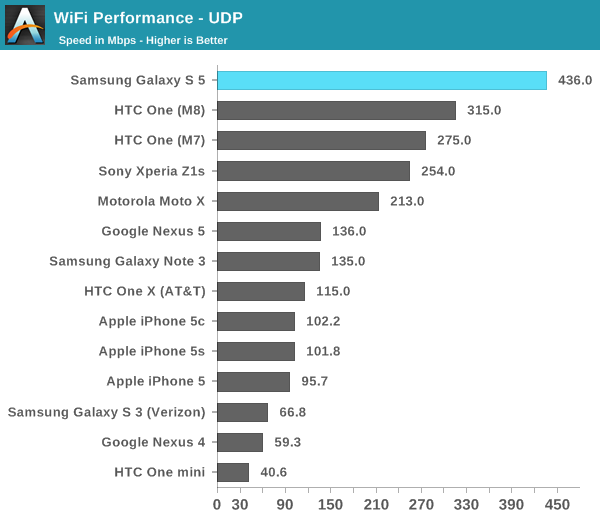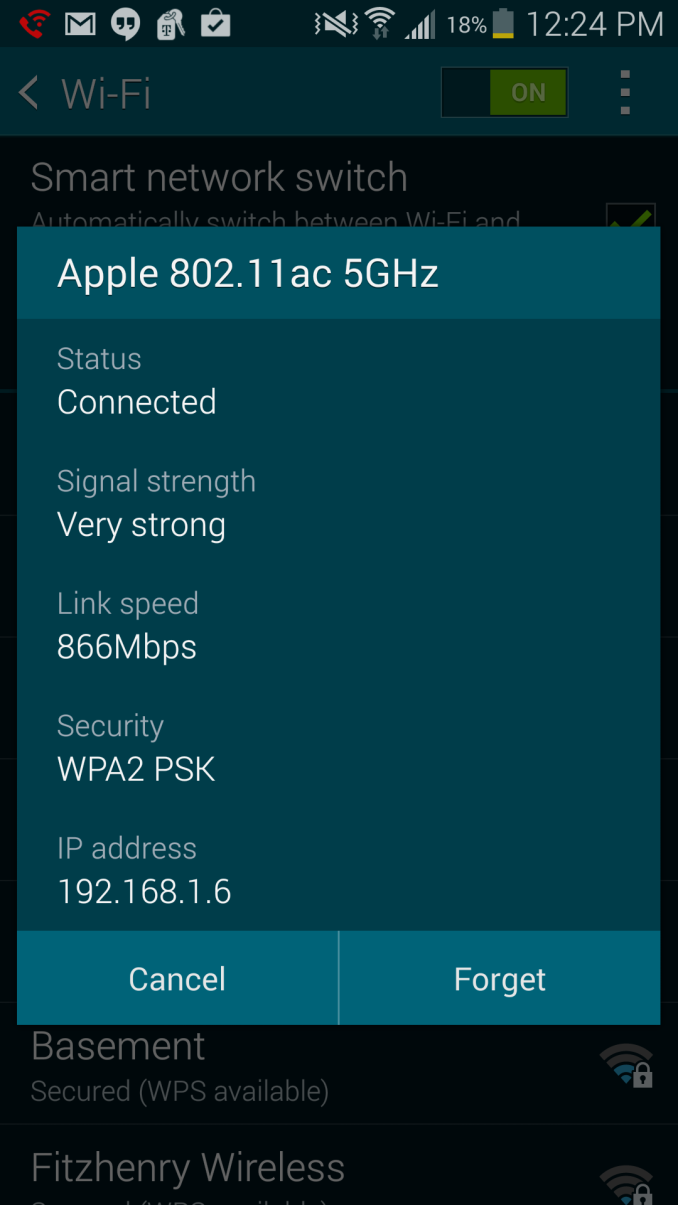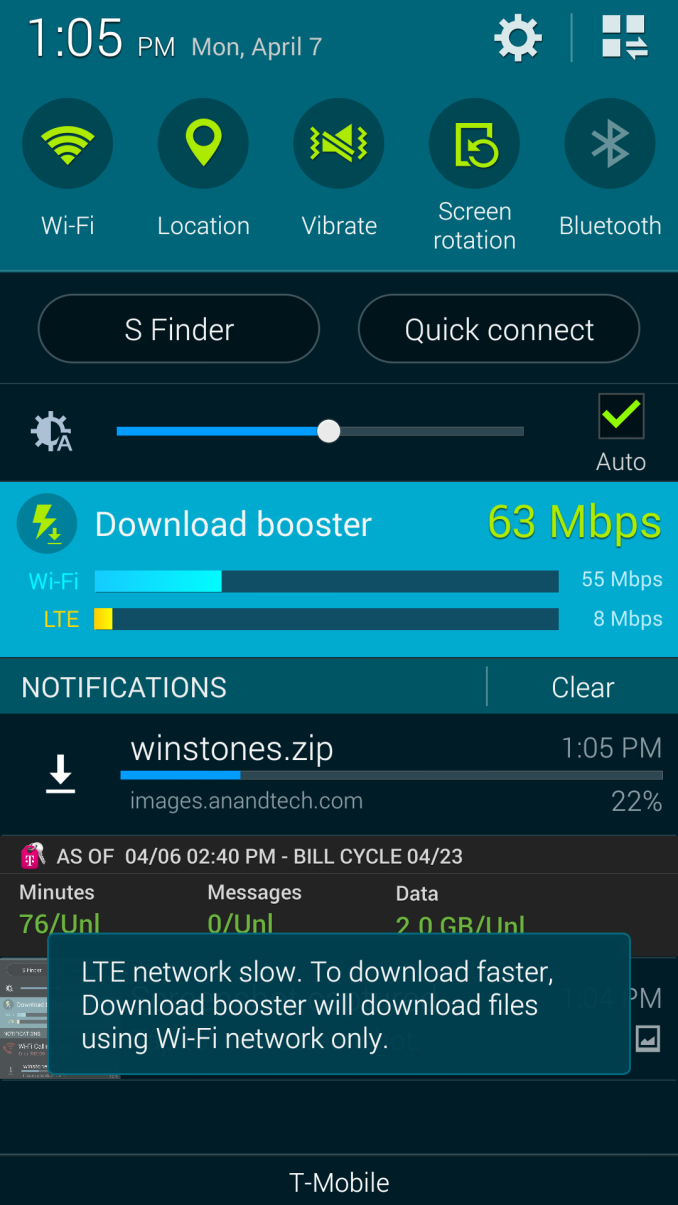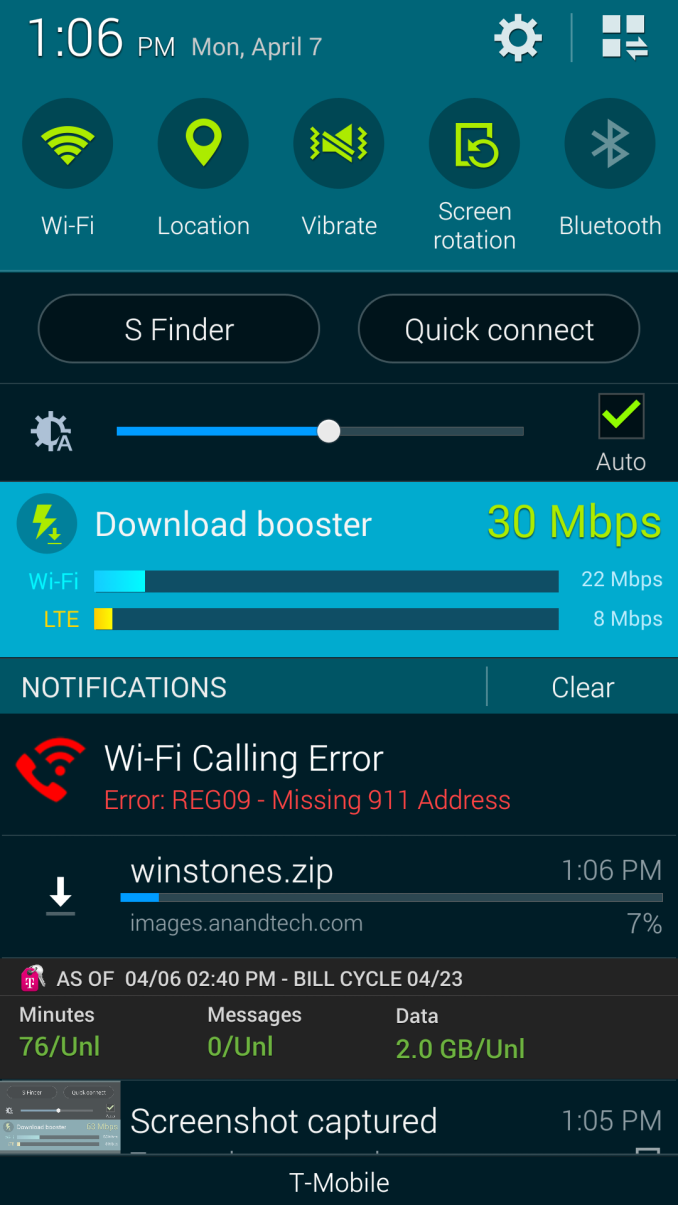Samsung Galaxy S 5 Review
by Anand Lal Shimpi & Joshua Ho on April 8, 2014 12:00 AM EST- Posted in
- Smartphones
- Samsung
- Mobile
- Galaxy S 5
WiFi, Cellular & Download Booster
At MWC this year Broadcom announced its BCM4354 802.11ac 2x2 MIMO WiFi combo chip for smartphones/tablets, which found its way into the GS5. The result is a smartphone capable of negotiating with an 802.11ac AP at 867Mbps, and transferring data at up to 436Mbps.
Although peak performance is nice, there are also power benefits to being able to transfer data quickly over WiFi (race to sleep applies to network interfaces as well).

The Snapdragon 801 features Qualcomm's integrated category 4 LTE 9x25 modem core. As I mentioned in our power analysis, Samsung also chose to include Qualcomm's QFE1100 envelope tracker (just like in the Galaxy Note 3). The GS5 is also the first flagship Samsung device to include support for 2 carrier aggregation on supported LTE networks. Samsung doesn't appear to be using Qualcomm's antenna tuner or any other RF360 components in the Galaxy S 5.
Seamless transition between network interfaces is one component of Qualcomm's vision of the future of connected devices. The problem is presently more of a software one than a hardware challenge. Samsung is beginning to explore software abstraction of underlying network interfaces with the GS5's software stack. There's now an option to prevent transitioning to WiFi networks that don't offer an improved network experience compared to your broadband connection. I haven't had a ton of time to test this feature out yet but it's something I plan on messing with more over the coming weeks.
The other big feature is what Samsung is calling Download booster. If enabled and under the right conditions, download booster allows you to combine WiFi and cellular network interfaces to accelerate large file downloads. All you have to do is enable download booster and you'll get a notification if it's active and working:
Download booster uses HTTP range requests to divide up files between the two network links. The feature can migrate data sessions from one link to another (WiFi to LTE, LTE to WiFi). Supported apps include the Play Store, YouTube, Facebook photo/video downloads, Samsung apps and standard HTTP web browsing (both Samsung's own browser and third party browsers). FTP and UDP aren't supported, nor is HTTPS.
There are other limitations as well. File downloads smaller than 30MB won't trigger download booster. Similarly, if one of the interfaces is substantially faster than the other download booster won't activate either. My home internet connection can regularly pull files down at 50 - 60Mbps, compared to < 10Mbps for T-Mobile LTE. When I was getting ~7Mbps over LTE and 50Mbps over WiFi, download booster automatically turned itself off. If I throttled my home network to 22Mbps however, download booster did its thing and gave me a healthy combined download speed of 30Mbps.
Download booster is a neat feature, although of limited use for those of us without truly unlimited high speed data plans. That being said, if you need to speed up a download in a pinch it's a great way to do that. I'm often at a press event wanting to download a benchmark onto a device as quickly as possible, usually without great WiFi or cellular reception - I can see download booster being very useful there at least.













296 Comments
View All Comments
theduckofdeath - Wednesday, April 9, 2014 - link
If you don't understand what Android is, I really don't see why I should discuss it with you.Android is a free to use open source platform. This means, manufacturers has to compile the code to their specific hardware, which takes a few months. NO ONE IN THE REAL WORLD CARES ABOUT THIS DELAY NIVA. NO ONE.
People who are been obsessed with stock experience pushed to their phones the minute Google announces a new update buy a Nexus phone. Everyone else buys the phone they feel best suits them. Most people teds to buy Galaxy S phones, simply because they are the best, and one of the very few with an OLED display.
Skinning Android is a necessity to create a feeling of an ecosystem the buyer feels at home with. For instance, I could never live with the skin Sony crams into their phones, in my opinion it's ugly in really incoherent. I have a Nexus tablet too, but I prefer TouchWiz, simply because it gives you a lot of really, really useful add/on features.
Anyone arguing a Nexus phone is the only choice, just because it has stock Android doesn't understand what a smartphone is. The Nexus 5 is a mediocre phone. At best.
jezzgoodwin - Wednesday, April 9, 2014 - link
I have to agree with the parents here. The Samsung Touchwiz UI suffers from lots of stuttering when in motion. When doing simple things like sliding between home screens, there is stutter.My friend has an HTC One which has a different UI and his phone is really smooth when doing transitions.
The Samsungs are brilliant phones, but they should really fix the stutter.
theduckofdeath - Thursday, April 10, 2014 - link
Try putting the exact same widgets on those two phones when you scroll. TouchWiz doesn't stutter from simple scrolling. However all operating systems stutter for instance when information has to be swapped from storage to RAM. Even my 8GB quadcore Haswell desktop PC does that fairly often.You should really try one out for real instead of basing your ideas off something you've basically read on a forum on the internet.
Kidster3001 - Wednesday, April 30, 2014 - link
Just use a different launcher from Touchwiz. My Note2 struggles a little in Touchwiz. I use Nova Launcher now and everything is much smoother. No root required, just install it and set as default launcher.Latzara - Wednesday, April 9, 2014 - link
pls --- a Nexus is on par with the currently leading phones for about 2/3 of the price -- that doesn't a mediocre phone make. And the usefulness of the Touchwiz addons is completely subjective -- had a Galaxy S and an SIII and in both cases it wasn't long till i flashed a custom ROM to get rid of all the crammed in usefulness...Don't paint a product with your personal experience and then extrapolate to everyone else. It just doesn't work that way and if you had any intention of being fair you'd know that. I don't like Touchwiz. Some do (i.e. you) but you can't argue that they add a bunch of apps that aren't directly tied to core functionality (like messaging for example which can't be removed) without even giving you a choice to uninstall what you deem unnecessary .... Lack of choice is always a grade down for me. I don't need the multitude of hubs for this and that and i can't get rid of them.
and btw, on the "NO ONE IN THE REAL WORLD CARES ABOUT THIS DELAY NIVA. NO ONE." part -- there is a large modding community that begs to differ ...
theduckofdeath - Thursday, April 10, 2014 - link
The Nexus phones are nice. But they are not on par. They're good value high/end phones, where the manufacturers cuts corners on pretty important things like display quality, camera and other things that are not easy to present in tech specs but are pretty obvious when you use them.Max(IT) - Saturday, April 19, 2014 - link
You are right, nexus aren't on par: they are better. When it comes to build quality, Samsung's devices disappear. A nexus 5 is far better build than a 700$ Galaxy S5 ....The nexus 5 isn't perfect, for sure. Battery and camera aren't the best on the market, but still is superior to any Galaxy S .... at a lower price point.
Stock Android makes it fast and responsive, without tons of gimmicks added by Samsung.
The only Samsung I would consider is a GPE.
theduckofdeath - Friday, April 25, 2014 - link
Build quality is better in the Nexus 5? Just because it's different materials, it definitely does not mean it's better built. The GS5 is IP67 certified, which actually requires higher precision and build quality than, you know, no IP certification.... :)DiHydro - Friday, April 25, 2014 - link
I work for a company that has IPX certified our products just this year, and I know first hand that IPX certification does not account for build quality or materials. I could get a cellphone made with cardboard and cellophane tape IP67 certified. This doesn't mean it is durable or well made.Kidster3001 - Wednesday, April 30, 2014 - link
I'd much rather have my plastic phone that bounces a little than a metal one. My personal opinion.